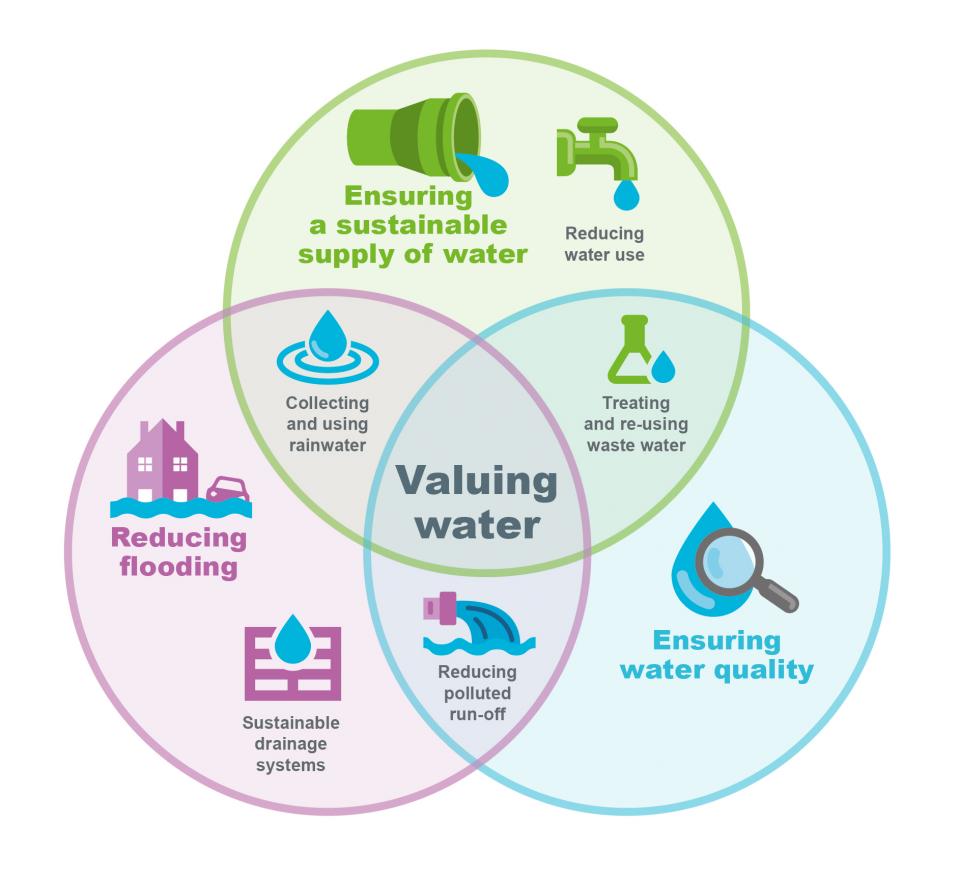
What will this policy do?
This policy will set out how development should address flood risk and implement integrated water management including sustainable drainage systems in new development.
Proposed policy direction
will be directed to the areas with the least likelihood of flooding from all sources and taking into account climate change (the policy will not need to repeat aspects covered by the National Planning Policy Framework).
Developments will be required to provide integrated water management, including sustainable drainage systems (SuDS), where surface water is managed close to its source and on the surface where reasonably practicable to do so. SuDS and green /brown roofs should provide multiple benefits (such as biodiversity and amenity). All hard surfaces must be permeable where reasonably practicable. Appropriate measures for future management will need to be demonstrated and secured.
Potential flood risk to developments will need to be fully addressed including demonstrating development is resilient or adaptive to flooding - Flood management policies will require that the risk of flooding is not increased elsewhere as a result of new development. The plan will set out the approach to runoff rates, including that peak runoff rate should be no greater for the developed site than it was for the undeveloped site.
Why is this policy needed?
In line with national planning policy, new development should be located in the areas of lowest flood risk where possible and should not increase flood risk elsewhere. A Level 1 Strategic Flood Risk Assessment (SFRA) (2021) has been prepared which identifies areas that may flood from all sources including rivers, surface water, groundwater, sewers and reservoirs. It also shows the potential impact of climate change on these areas of flood risk. The SFRA has been used to inform the selection of sites for allocation for development.
This policy is needed to supplement national policy with local considerations, and to ensure that water is managed sustainably. The measures used will vary depending upon the scale of the development but the diagram above shows the possible components of on-site integrated water management, the linkages and the benefits.
A key component of managing surface water are sustainable drainage systems (SuDS). SuDs re-create the benefits of natural drainage systems and collect, store, slow and treat the quality of surface water to mitigate the impacts of development on run-off rates, volumes and quality. SuDS also have multiple benefits, such as enhancing biodiversity and creating amenity space with health and well-being benefits. Any water collected should be re-used wherever possible, which will provide additional water supply and will be key to achieving a high level of water efficiency in developments (also see CC/WE on water efficiency).
What consultation have we done on this issue?
Responses to the First Conversation consultation said that we should avoid developing in flood risk areas. The new should adapt to the effects of climate change through being prepared for increased flood risks. should be resilient or adapted to flooding. Flood management policies should ensure that the risk of flooding in the area is not increased as a result of new development. Sustainable water management and permeable external surfaces were supported.
What alternatives did we consider?
No policy, rely on national guidance – Not considered a reasonable alternative, due to the need to respond to local issues, and include a robust approach to drainage and water management.
Supporting evidence studies and topic papers
-
: Topic paper 2: Climate Change
-
Level 1 Strategic Flood Risk Assessment (2021)
-
Study (2021)
Existing policies in adopted 2018 Local Plans
South Cambridgeshire 2018
-
Policy CC/7: Water Quality
-
Policy CC/8: Sustainable Drainage Systems
-
Policy CC/9: Managing Flood Risk
Cambridge 2018
-
Policy 31: Integrated water management and the water cycle
-
Policy 32: Flood Risk
Tell us what you think
Our consultation for this phase is now closed.